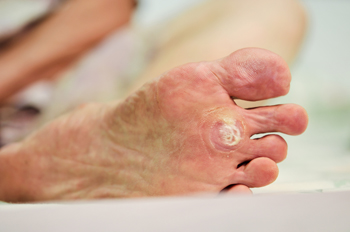Symptoms and Treatment of Plantar Warts
Tuesday, 23 January 2024 00:00
Plantar warts, caused by the human papillomavirus, or HPV, are thick, rough skin growths found on the bottom of the foot. While they are benign, the discomfort they can cause is far from trivial. Plantar warts typically form on pressure points such as the heel or ball of the foot, entering the skin through cuts or scratches. Direct contact with an infected surface or person can also lead to their development. Treatment options include keratolytic therapy, cryotherapy, immunotherapy, and laser therapy. In severe cases, surgery is needed. Keratolytic therapy employs acid medication to thin the wart, prompting the outer skin layer's shedding. Cryotherapy involves freezing the wart with liquid nitrogen, creating a red blister that eventually leads to the wart's natural removal. Immunotherapy, using creams or shots, enhances your immune system to combat HPV and eliminate the wart. Laser therapy utilizes focused light to cut away the wart, while surgical removal, performed by numbing the skin and burning the area, becomes necessary in some cases to prevent recurrence. If you have been infected with plantar warts, it is suggested that you schedule an appointment with a podiatrist who can examine your foot and suggest the treatment option that is best for you.
Plantar warts can be very uncomfortable. If you need your feet checked, contact one of our podiatrists from Bazzi Podiatry. Our doctors will assist you with all of your foot and ankle needs.
About Plantar Warts
Plantar warts are the result of HPV, or human papillomavirus, getting into open wounds on the feet. They are mostly found on the heels or balls of the feet.
While plantar warts are generally harmless, those experiencing excessive pain or those suffering from diabetes or a compromised immune system require immediate medical care. Plantar warts are easily diagnosed, usually through scraping off a bit of rough skin or by getting a biopsy.
Symptoms
- Lesions on the bottom of your feet, usually rough and grainy
- Hard or thick callused spots
- Wart seeds, which are small clotted blood vessels that look like little black spots
- Pain, discomfort, or tenderness of your feet when walking or standing
Treatment
- Freezing
- Electric tool removal
- Laser Treatment
- Topical Creams (prescription only)
- Over-the-counter medications
To help prevent developing plantar warts, avoid walking barefoot over abrasive surfaces that can cause cuts or wounds for HPV to get into. Avoiding direct contact with other warts, as well as not picking or rubbing existing warts, can help prevent the further spread of plantar warts. However, if you think you have developed plantar warts, speak to your podiatrist. He or she can diagnose the warts on your feet and recommend the appropriate treatment options.
If you have any questions please feel free to contact one of our offices located in Detroit, West Detroit, Northwest Detroit, Sterling Heights, Hamtramck, Dearborn Heights, Madison Heights, Redford, and Livonia, MI . We offer the newest diagnostic and treatment technologies for all your foot and ankle needs.




